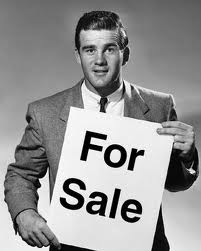 Despite its importance to our national economy the B2B sector has, I believe, always been overlooked when it comes to anything related to marketing or sales, and I think this is a major oversight.
Despite its importance to our national economy the B2B sector has, I believe, always been overlooked when it comes to anything related to marketing or sales, and I think this is a major oversight.
Of course, a sales focus or orientation was a less important part of the marketing mix in the booming 1980s and ‘90s but it is once again becoming increasingly more important for both B2B and B2C marketers, and rightfully deserves a lot more attention from managers and business owners.
Consider the following scenario – Australia circa 2013:
1) Plenty of choice for virtually all products/services
2) Imports are keeping all prices down
3) Low interest rates and plentiful credit
4) All types of advertising are less effective
5) More forms of media than ever before
6) Sales professionals command top salaries
7) Local call centres are becoming expensive
8) Local brands are under threat
9) Generics are increasing shelf space everywhere
10) Uncertainty – elections and economy generally
You’d have to agree it’s a pretty daunting environment for business managers and marketers (whether they’re B2B or B2C) to operate in.
What this means is it’s now much harder to persuade prospects to make a purchase decision than it has been in the past and often the advertising / promotional package being offered is simply not compelling enough to convince them to sign an order.
What’s more, in my experience industrial buyers in this country are very conservative and extremely risk averse. That is to say, over a 30 year career in industrial sales I have observed they definitely do not like uncertainty and, given the current climate, they would much prefer to do absolutely nothing rather than make even a small purchase decision they think they may ultimately live to regret.
Time to pull out the big guns and that means professional sales staff selling face-to-face. Direct in person representation remains the most effective means of selling (B2B or B2C) … no question.
However, the major problem with this approach is the cost of direct selling is becoming increasingly more expensive.
Most business managers I know will tell you an average B2B sales call costs at least $300-400 and for many products/services a professional sales person will convert about 50% of ‘quality’ leads. That works out at $600 per sale and with a 40% margin takes a minimum $1,500 in sales to recoup.
Of course with B2B it’s normally not the price of a single sale alone that’s important and usually the ‘whole of life’ perspective can be applied to justify the sales expense. For example, a courier company might like to win a new customer who racks up $1,000 a month (on-going) on their account but only spends less than $25 on each single item they order. This is how AdWords campaigns can often be justified since we are really talking about ‘customer acquisition’ not sales per se.
Obviously, for sales with price tags in the tens or hundreds of thousands (even millions) of dollars, an awful lot more calls can be made or justified and as a consequence corporations primarily rely on professional sales staff at all times.
In this situation the management focus ultimately becomes how much does it cost to generate the leads? And how do you test the quality of leads being generated?
This approach has seen many local call centre jobs being outsourced overseas, however I would caution that if not managed sensitively this strategy can backfire as many business people (me included) do not appreciate having to accommodate language difficulties, time differences, lack of local knowledge or waiting excessive times for calls to be answered.
In my view how a call centre handles enquiries is a reflection on how that organisation treats its customers. Most industrial buyers not only expect some respect they demand it, and management should carefully consider how they handle this on-going customer interface.
In conclusion, I would emphasise that despite B2B selling being such a challenge … the rewards for getting it right are not only worth aiming for, but they are essential for your business and industry generally to prosper.
CONTRIBUTOR – Andrew M Connery: A B2B marketing practitioner by profession and former Federal Vice-President of the Australian Marketing Institute (AMI). Until July 2011 he was a Senior Trainer for the Federal Government’s Small Business Online program. Andrew’s latest project is a joint venture with Barnetts Couriers to introduce 24/7 smart lockers for online purchases.
Comments
Powered by Facebook Comments
